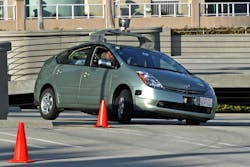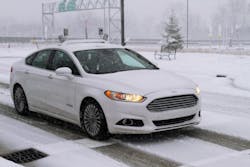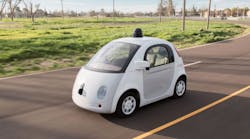Are Americans truly ready to let go of the steering wheel and let autonomous vehicles do all the driving? This, of course, is the key question in the debate over whether fully driverless technology will establish a beachhead on our roadways.
For if John Q. Public doesn’t want to hand over the car keys, so to speak, and buy autonomous vehicles in substantial numbers it’ll become more difficult for this technology to sustain itself in the market.
Right now, though, depending on what survey you read, American motorists are either eager to buy vehicles equipped with self-driving systems … or they remain decidedly reluctant to do so. In a word, the polls on this topic are “conflicted,” so a lot more convincing may need to be done.
Take a recent survey by the Consumer Technology Association (CTA). That group found that the “vast majority of consumers,” or some three in four, are “excited” about the many benefits driverless vehicles can offer, with almost two-thirds want to swap their current cars for completely self-driving vehicles – a direct contrast to other surveys that indicate consumer hesitancy toward the adoption of self-driving cars.
The CTA’s report – Self-Driving Vehicles: Consumer Sentiments – also finds almost all drivers (93%) who use existing driver-assist features such as parking assist, adaptive cruise control and collision avoidance appreciate the usefulness of these driving technology innovations.
“Clearly, drivers are getting more and more excited about everything that driverless cars will offer us; 90% fewer U.S. traffic accidents, 40% lower insurance costs, the end of drunk driving accidents and newfound freedom for seniors and people with disabilities,” noted Gary Shapiro, CTA’s president and CEO, in a statement.“The broad adoption of self-driving vehicles will save tens of thousands of lives each year in the U.S. alone, and deliver a level of independence and mobility that seniors and people with disabilities couldn’t otherwise dream of enjoying,” he said.
Yet hold on a minute here. Another survey, this one conducted by Kelley Blue Book (KBB) reveals that Americans are most comfortable with the vehicles currently on the road today, believing that they are significantly safer than models with a “higher level of autonomy.”
That poll – part of the 2016 Kelley Blue Book Future Autonomous Vehicle Driver Study and conducted by market research firm Vital Findings – found that consumers are torn between the need for safety and the desire for control, with 51% of respondents replying that they prefer to have full control of their vehicle, even if it's not as safe for other drivers, while 49% prefer to have a safer roadway for all, even if that means they have less control over their own vehicle.
"The industry is talking a lot about self-driving vehicles these days, with multiple automakers and ride share companies throwing their hats in the competition to build and release the first fully autonomous vehicle to consumers," noted Karl Brauer, a KBB senior analyst, in a statement. "Much is still unknown about fully autonomous vehicles, including how they would react in emergency situations.”
Yet he pointed out that “lower-level options” are gaining steam with John Q. Public, with many Americans interested in purchasing vehicles with Level 2 semi-autonomous features.
[FYI: KBB references the six levels of vehicle autonomy in it survey as defined by the Society of Automotive Engineers (SAE), from Level Zero with human-only control all the way up to Level 5 with no human driver.]
“For these consumers, the biggest purchase barrier is market supply,” Bauer said. “For tentative buyers, first-hand experience like test drives, short-term leasing or daily rentals will be crucial [for] making future purchasing decisions. Automakers will need to address hesitant drivers in order to be successful."
According to KBB’s survey, awareness of the higher levels of vehicle autonomy is limited, with six out of 10 respondents admitting that they know little or nothing about autonomous vehicles.
For half of the survey respondents, the perception of safety and personal comfort with autonomous technology diminished as the level of autonomy increased. When survey respondents were asked to make a choice between the different levels, Level 4 autonomy hits the "sweet spot" by providing all the benefits of full vehicle autonomy without stripping away the option of driver control.This isn't surprising, considering 80% of the respondents to KBB’s poll believe that people should always have the option to drive themselves, with 64% preferring to be in control of their vehicles.
In fact, most consumers (62%) do not think they will live to see a world where all vehicles are fully autonomous, KBB found.
Yet CTA by contrast purportedly discerned a completely different consumer mindset.
According to its research, the popularity of driver-assist technology already available to consumers is “sky-high” as almost all consumers (96%) like or love automatic parking-assist capabilities, with 94% feel the same about collision avoidance systems.
Perhaps most indicative of this sector's potential, half of all non-users want to upgrade to driver-assist technologies. Additionally, data alert systems enjoy immense consumer support with 97% of consumers satisfied with their navigation assistance technology and 94% either “liking” or “loving” vehicle maintenance alerts.
“We don’t have to wait for the benefits of self-driving cars to arrive – driver-assist technology is already saving lives, avoiding accidents and paving the way for completely driverless innovations still to come,” said CTA’s Shapiro. “We should promote these technologies that help drowsy or inattentive drivers stay focused, or provide specific responses such as automatic braking and lane-drift avoidance – all of which are now widely available in newer model vehicles.”
The CTA study also shows four in five consumers recognize the potential benefits driverless technology can offer. Consumers are most excited about self-driving technology’s ability to:
- Reduce accidents caused by aggressive driving or driving under the influence of drugs or alcohol (82%)
- Provide monetary savings on car insurance (80%)
- Prevent up to 90 percent of driving-related accidents and injuries on U.S. roads (79%)
- Offer new mobility options to people with disabilities (78%)
In addition to the 62% of consumers who are interested in replacing their current cars or trucks with completely self-driving vehicles, CTA’s poll found that 70% of consumers have a strong interest in testing a driverless car for themselves.
So where does the truth truly lay in all of this? Will everyday motorists truly welcome the driverless vehicle or not? If you ask me, with split survey results like the ones above, the jury definitely remains out.


